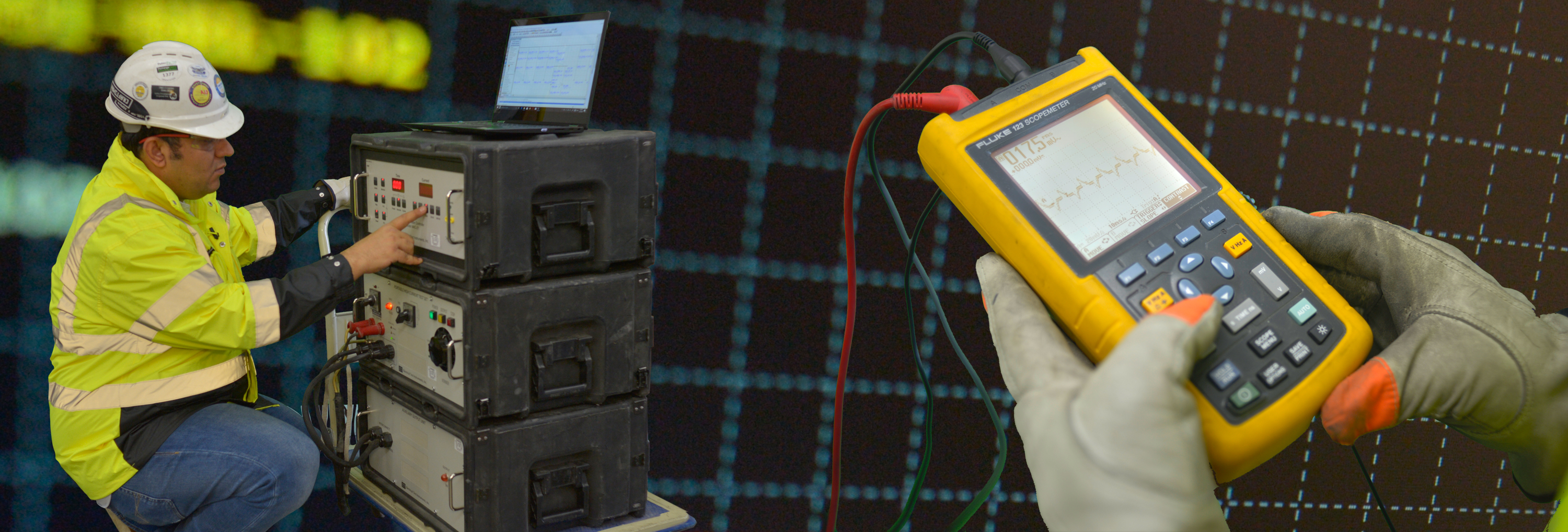Conventional tests (IR/ PI, DF/PF HI POT …) are very useful for Preventive maintenance but have limitations. These tests are only capable of assessment of the overall condition of the insulation and may not show mechanical problems, small winding shorts, or partial discharge location.
Advance tests can be performed on-line or off-line. Insulating problems can be localized and detected. Root cause analysis can be performed. Advanced testing provides required data for predictive maintenance without compromising reliability or safety. It can be applied at any stage of the asset’s life, from installation and commissioning, as part of a condition-based asset maintenance programmed, and right through to diagnosing and locating a potential problem.
Advanced Tests
Partial Discharge (PD)
PD test can be performed on Transformers, Switchgear, Cable, and rotating machinery. Insulation Failures begin with and are characterized by small but detectable releases of energy or Partial Discharge (PD). PD causes progressive deterioration of insulating materials, ultimately leading to electrical breakdown. In medium and high voltage equipment PD is the first indication of insulation breakdown. (Percentage of insulation failure (IEEE Gold book table 36): Transformer: 84%, Circuit Breaker: 21%, Cable: 89%.)Sweep Frequency Response Analysis (SFRA)
The SFRA test is a powerful and sensitive technique to evaluate the mechanical integrity of core, winding and clamping structures within power transformers by measuring their electrical transfer functions over a wide frequency range. It is performed by injecting a variable frequency AC voltage to each winding and plotting the responding current as a curve. Typically, these ‘finger print’ reference curves are captured either when the transformer is new or when it is known to be in good condition. They are then used as a baseline during maintenance tests or when there is a reason to suspect a problem.Frequency Domain Spectroscopy (FDS)
The test set up for an FDS test is virtually the same as that used for conventional tan δ testing. The big difference is that conventional tan δ tests are carried out only at power frequency, whereas as FDS tests involve injecting a test signal that sweeps over a wide range of frequencies, typically from a millihertz or so up to around a kilohertz. By recording the response of the Transformer to this test signal during the frequency sweep and analyzing the results, it is possible to reliably estimate volume of moisture and presence of contaminants in the solid insulation, as well as the conductivity and power factor of the oil. No oil sampling is of course required with this method, so not only is more convenient, it also means that testing can be carried out regularly with no risk of depleting the volume of oil in the transformer.Motor Current Signature Analysis (MCSA)
(MCSA) is a condition monitoring technique that is now widely used to diagnose problems such as broken rotor bars, abnormal levels of airgap eccentricity, shorted turns in low voltage stator windings, and certain mechanical problems. This test is performed online without interrupting production with motor running under the load at normal operating conditions, MCSA can be used as predictive maintenance tool for detecting common motor faults at early stage and as such prevent expensive catastrophic failures, production outages and extend motor lifetime. It can be used as a diagnostic tool and powerful addition to vibration and thermal monitoring (verifying a fault with more than one technology).Advantages of Advanced Testing
. PREDICTIVE: Failures can be prevented.. NO OUTAGE NECESSARY: Dose not interrupt operations.
. NON-DESTRUCTIVE: No damage to electrical system.
. TRENDING: Comparison to previous tests possible.
. PRIORITIZE MAINTENANCE ACTIVITIES: Determine which equipment to service first.
. PLANNING: Allows time to schedule repairs.
. FINANCIAL CONTROL: Repairs can be budgeted.
ACE team can perform advanced tests and provide maintenance programs. We offer advanced test on medium and high voltage electrical equipment.


